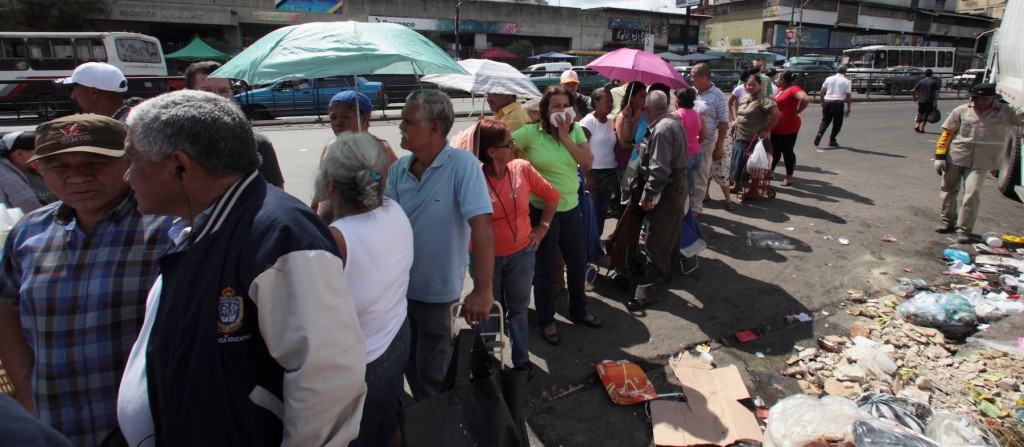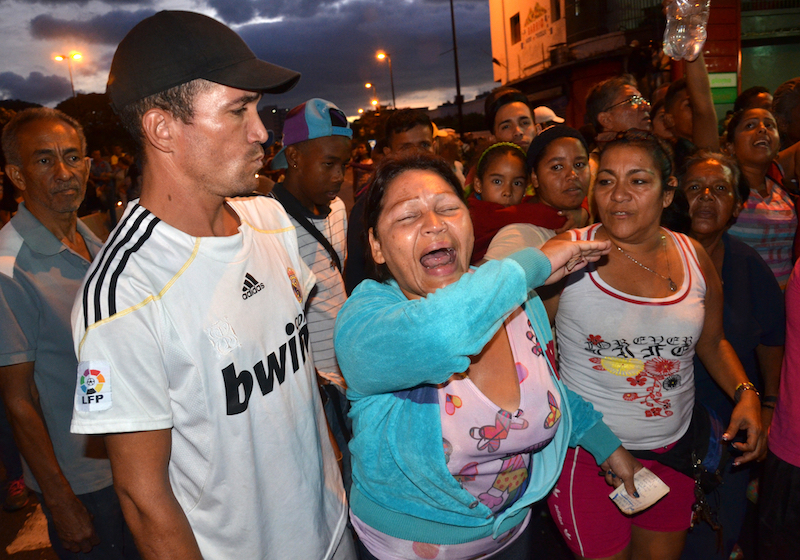
Supermarket queues, no toilet paper, chicken that costs a week’s wages. What’s going on in Venezuela?
Today in Venezuela, people are having to queue up outside state-run supermarkets just to get basic necessities, like flour and toilet paper. Once inside, they’re often faced with empty shelves, because all the cheap food has gone. Elsewhere, prices are much higher, but not everyone can afford them. But why? And what is a ‘price’ anyway?
State-run supermarkets control the pricing of their products, keeping it low to make sure that the poor majority in Venezuela can afford their daily nutrition. ‘Normal’ supermarkets sell their goods at the market price. Because demand for food is way higher than supply at the moment, their prices are much higher than the state's.
The point of state-run supermarkets keeping their prices low is to make sure that no matter how bad things get (and they're getting pretty bad), anyone can afford to buy food. But somehow, these 'price controls' are creating exactly the situation that the government is trying to prevent: empty shelves and hungry people. How?
When life gives you lemons
So, what are prices anyway? In theory, prices are just signposts that say: “This is how much society values my existence”. When life gives you lemons and you make lemonade to sell on the street corner, how much you sell depends a lot on the price you charge. Set the price too high, and people will think it’s too expensive. Set the price too low, and people will think it's not very good.
So, the price of your lemonade gives a ‘signal’ as to its value to people. The idea is to set a price that’s just right. One that matches the value others see in your lemonade, covers your cost of making it, and gives you a bit of profit for good measure.
So what's going on in Venezuela?
The problem? Well, prices are never perfect. In Venezuela, economic realities are much more complicated than lemonade economics. That’s because prices are influenced by lots of things, with retail price controls enforced by the government being only one example.
So, what’s been causing the food shortages?
First up, they’ve been suffering from very high levels of , which is where prices rise very quickly (this is often called 'hyperinflation'). In Venezuela prices are predicted to go up by 481% this year. When inflation happens, the value of the currency tumbles. This has happened to the extreme in Venezuela, to the point where some cafés are using banknotes as napkins!
State supermarkets, wanting to save the day, set price controls on staple goods like milk, meat, and corn, that are actually affordable. When price controls are set on a good, putting prices up is illegal. Great!
The trouble is, that's easier said than done. Local food producers have a hard time supplying goods so cheap, because inflation is affecting them too. Running their business is becoming more and more expensive, and the only way they could deal with that is to increase the prices of their products...which they can't, because of price controls. Some of them have just given up entirely.
Local fruits, vegetables, beef and chicken are still available at ordinary supermarkets, but the poorest Venezuelans cannot afford them. Two kilos of chicken in a normal supermarket costs about 6,000 bolivares. The minimum wage in Venezuela is around 22,000 bolivares. So to buy two kilos of chicken means spending over a quarter of your monthly income!
To make matters worse, Venezuela imports about two-thirds of its food from abroad. Because the value of the currency has dropped, Venezuelan importers can buy fewer products on international markets with their bolivars.
The poorest can’t shop anywhere else but at the state-run supermarkets. The government can’t force producers to supply or import food at a loss, so the system freezes (there's even more problems we've not gone into here if you're interested – trust us, it's pretty desperate.) The result: long lines and empty shelves where staples like toilet paper and eggs used to be. And people getting very angry.

I never knew prices were so complicated
Yep! We tend to think that the market sets prices and that’s that, but governments of all kinds (not just socialist ones like Venezuela) attempt to influence the price of stuff, in one way or another.
In Germany for example, the government puts loads of money into stimulating renewable energy. Same for the car industry in China. By supporting these industries with government money, or 'subsidies', they're indirectly lowering the prices of the stuff that German energy producers and Chinese car producers need to make their product. Sometimes that’s a good thing, but in China they’re now experiencing the downside of subsidizing car production, like the thick smog seen in cities like Beijing. So things don't always go as planned (like Venezuela shows!)
The problem is that trying to directly set the prices of things (as in Venezuela) is a bit like trying to catch the wind with your hands. A government is rarely able to collect the mountains of information needed to set the ‘correct’ price of something because prices are constantly changing in reaction to how quickly our world changes day by day.
Let's look at lemonade again. Imagine the government telling you that you’re not allowed to sell your lemonade for more than $1.50, but you literally can't make it for that cheap. You know this because you went to the supermarket to buy the lemons and sugar and couldn't afford it; but at the same time, the supermarket has its own costs and profit margins, so they can't lower their prices either. That's partly because the lemon farmer charges the supermarket a price that she has calculated to cover her costs of growing the lemons. And so on.
Now, imagine a government trying to do all this itself, in a way that meets the needs of everyone involved. Oh, and constantly keeping track of the prices in each link of the lemonade production chain, to be able to set a ‘correct’ price in the supermarket. Seems like a lot of work right?
Well, it is. That’s why, far from preventing food shortages, price controls can contribute to them. Each time a price is set by the government, it’s already old news. In the case of Venezuela, the price controls are a like putting a band-aid on a wound that actually needs stitching.
Unfortunately, when prices don’t reflect reality and inflation hits hard, poor people become the victims. The ‘Maduro diet’, as those tired of this president's policies are calling it, is causing untold misery.
Venezuela food crisis: “We are now living on Maduro’s diet: no food, no nothing.” https://t.co/m3JZWeJxXS pic.twitter.com/hDf5Y0qPlo
— New York Times World (@nytimesworld) June 20, 2016
In theory, prices should reflect what society thinks something is worth. In practice, prices are a battleground of competing interests. In the case of Venezuela, price controls are a political tool, not an economic one. They're kept in place to ensure the poor can eat, but, in the face of immense economic pressures, seem to be doing the exact opposite.



